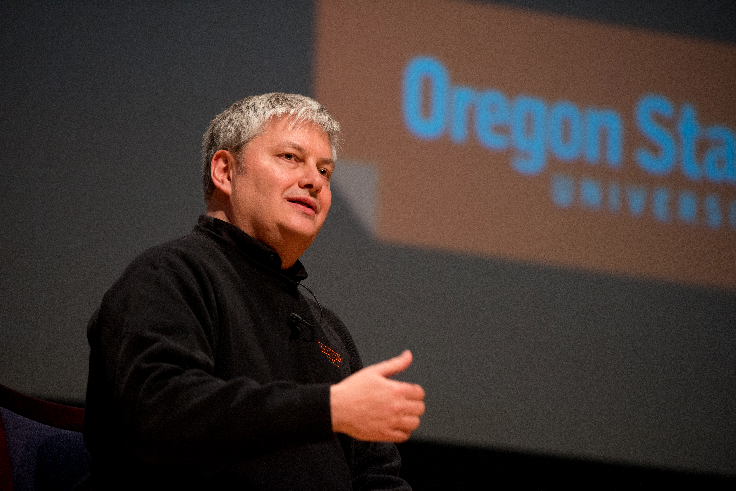News, articles, and interesting stuff from the College of Business

Jon DeVaan said while he was working on the initial release of Excel, the current Microsoft corporate vice president didn’t know the program would become an omnipresent part of work life.
“The focus was ‘We think this will help people a lot, and everything will flow,’” DeVaan told the audience at Wednesday’s College of Business Dean’s Distinguished Lecture at the LaSells Stewart Center.
DeVaan has been at Microsoft since graduating from OSU in 1982, starting with his work on Excel and most recently helping to design the new Windows 8 operating system. DeVaan ran his presentation from a Microsoft Surface, the company’s new tablet computer.
The theme of the talk was how individuals and organizations must focus on improving, or risk falling behind by simply continuing to do what brought them success in the past.
In his own experience, DeVaan recounted how when he started with Excel, Lotus 1-2-3 was the dominant spreadsheet program. But while Lotus saw only a professional market for its product, Microsoft wanted to make a product that could be used by anyone.
“Our motto was a computer on every desk, in every home,” DeVaan said.
A quarter century later, that initial goal has helped make computing accessible for many more people than even DeVaan imagined at the time. He remembers sitting on a plane and being grabbed by the person next to him after mentioning he worked on Excel.
“He said he hated his boss, but he didn’t need him anymore because he had a PC and could start out on his own,” DeVaan remembered.
DeVaan counseled the audience to always confront hard truths and set aside time to fix them. To work smarter, not harder, which can be difficult when that sometimes hurts efficiency in the short term.
He noted that the initial release of Word, the popular text editor, was delayed for two years and Access, a database management program, was cancelled twice.
DeVaan said at Microsoft the company has built in time for “renewal activities,” reviewing how the company is working, not just what it’s producing.
“No one ever gets credit for fixing problems that never happen,” DeVaan said, borrowing a favorite quotation.
Instead, he pointed out “everything real has problems,” and the key to good leadership is knowing which problems have to be fixed and which are OK to live with, for now.
As long as you take time to focus on improving the process, and not just trying to fix every issue as it comes up, you’ll find things get better in the long run.
“You don’t know where new ideas will come from, but renewal activities create the space where that’s possible,” DeVaan said.